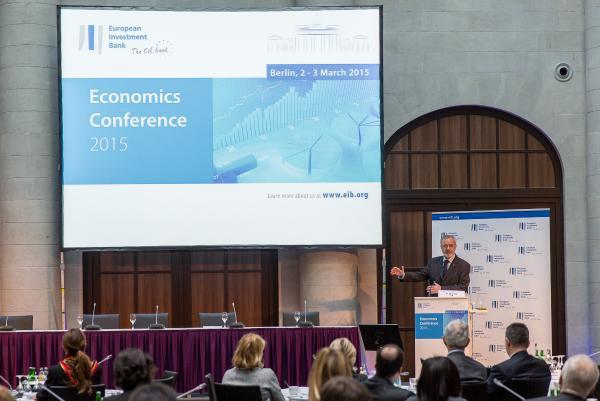
Investment and Investment Finance in Europe Investing in Competitiveness and Innovation
The investment plan for Europe has put long-term investment and the economic competitiveness of Europe back on the agenda. It also draws the attention to some fundamental questions for Europe’s economy: Are we investing enough? What is holding back investment? How can investment support innovation and Europe’s ability to compete?
Declining productivity growth is undermining Europe’s ability to compete in the global marketplace. This was the message of economic experts and policy makers as they discussed recent political and macro-economic efforts to restore competitiveness in Europe and respond to structural investment needs. Bringing together more than 100 participants from academia, public and private sectors, the annual EIB Economics Conference was held on 3 March in Berlin, as part of the EIB Momentum for Europe event.
Creating the right environment for investment and innovation
In his opening speech, EIB President Werner Hoyer called for a concerted effort to create an environment where investment and innovation naturally take place: “This means a combination of structural reforms in Member States, efforts to complete the EU internal market where needed and a well targeted investment stimulus, which addresses long-term competitiveness challenges.” Hoyer also pointed to the shifting global environment for competition: “In a globalised world, it is really firms that compete, not countries. It is at the firm level that the all-important innovation process mostly takes place. But this does not mean that policy makers and public institutions can just wash their hands and hope for the best. We have a vital role to play, creating the right conditions and the right incentives to foster a dynamic process of innovation.”
Increasing impact, targeting market failures
The ensuing expert panels discussed latest investment trends and the state of Europe’s competitive position in the global market place. With current investment below depreciation levels, they debated investment needs and the role of public initiatives to stimulate public and private investment that enhances productivity and growth. With Europe’s banks facing constraints impeding their ability to absorb further risk, it was argued that ample liquidity in the system is not translating into the right kind of risk financing instruments. Yet to be able to compete in an increasingly open world, a dynamic and technologically innovative economy is critical.
“Fiscal, monetary and structural policies are synergistic,” said Catherine Mann, Chief Economist at the OECD. “We can’t just strip out structural and say, do this, do that, and ignore what’s happening on the demand management side. In order for structural reforms to get traction, you need to have a strong demand environment.” She asked how the Investment Plan for Europe, or “Juncker plan”, could help address these challenges. “What we find is that the multipliers for collective spending are greater than those for individual national projects. So collective action matters. Second, we find that regulatory harmonisation could increase cross-border FDI and trade intensity in Europe by up to 25%. So the potential pay-off to completing the single market is very large.”
EIB Chief Economist Debora Revoltella argued that a well-targeted investment stimulus, such as the Investment Plan for Europe, could help address short-term cyclical issues while targeting long-term competitiveness challenges: “This is a case of investment action that targets competitiveness-enhancing investment needs such as research and development, education and strategic infrastructure. Public intervention to incentivise this kind of investment needs to be transparently managed. It has to target market failures without undermining competition.”
Related documents
EIB Annual Economics Conference Agenda [EN]
European Competitiveness in an Open World (opening remarks) - Debora Revoltella, EIB [EN]
European Competitiveness in an Open World - Catherine L. Mann, OECD [EN]
European Competitiveness in an Open World - Boris Vujčić, Croatian National Bank (HNB) [EN]
Assessing competitiveness in an increasingly borderless world - Filippo di Mauro, ECB [EN]
European Competitiveness in an Open World - Michael Landesmann, Johannes Kepler University [EN]
Enhancing Productivity Growth - Philippe Aghion, Harvard University [EN]
Investment in Europe, where do we stand? (opening remarks) - Pedro de Lima, EIB [EN]
Investment in Europe - Christian Mumssen, IMF [EN]
Investment as a driver of growth? - Daniel Gros, Centre for European Policy Studies (CEPS) [EN]
A few remarks on the case study of Poland - Jan Bielecki, Ernst & Young Poland [EN]
Financing investment in competiveness - Helmut Kraemer-Eis, EIF [EN]
Investing in Competitiveness and Innovation - José Fernando Figueiredo, European Association of Guarantee Institutions (AECM) [EN]
Financing investment in competitiveness - Dörte Höppner, European Private Equity and Venture Capital Asoociation (EVCA) [EN]

Photographer: EIB ©To be defined
Download original

Photographer: EIB ©To be defined
Download original

Photographer: EIB ©To be defined
Download original

Photographer: EIB ©To be defined
Download original

Photographer: EIB ©To be defined
Download original

Photographer: EIB ©To be defined
Download original

Photographer: EIB ©To be defined
Download original

Photographer: EIB ©To be defined
Download original

Photographer: EIB ©To be defined
Download original

Photographer: EIB ©To be defined
Download original

Photographer: EIB ©To be defined
Download original

Photographer: EIB ©To be defined
Download original

Photographer: EIB ©To be defined
Download original

Photographer: EIB ©To be defined
Download original